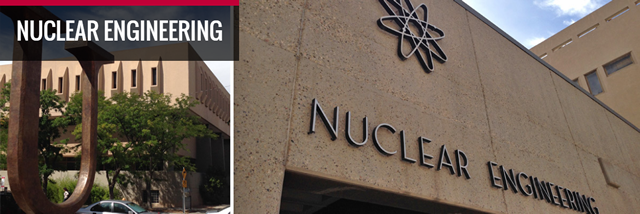
Nuclear Engineering ETDs
Publication Date
Fall 12-2016
Abstract
The calculation of the thermal neutron Doppler temperature reactivity feedback co- efficient, a key parameter in the design and safe operation of advanced reactors, using first order perturbation theory in continuous energy Monte Carlo codes is challenging as the continuous energy adjoint flux is not readily available. Traditional approaches of obtaining the adjoint flux attempt to invert the random walk process as well as require data corresponding to all temperatures and their respective tem- perature derivatives within the system in order to accurately calculate the Doppler temperature feedback.
A new method has been developed using adjoint-weighted tallies and On-The-Fly (OTF) generated continuous energy cross sections within the Monte Carlo N-Particle (MCNP6) transport code. The adjoint-weighted tallies are generated during the con- tinuous energy k-eigenvalue Monte Carlo calculation. The weighting is based upon the iterated fission probability interpretation of the adjoint flux, which is the steady state population in a critical nuclear reactor caused by a neutron introduced at that point in phase space. The adjoint-weighted tallies are produced in a forward calcu- lation and do not require an inversion of the random walk. The OTF cross section database uses a high order functional expansion between points on a user-defined energy-temperature mesh in which the coefficients with respect to a polynomial fit- ting in temperature are stored. The coefficients of the fits are generated before run- time and called upon during the simulation to produce cross sections at any given energy and temperature. The polynomial form of the OTF cross sections allows the possibility of obtaining temperature derivatives of the cross sections on-the-fly.
The use of Monte Carlo sampling of adjoint-weighted tallies and the capability of computing derivatives of continuous energy cross sections with respect to tempera- ture are used to calculate the Doppler temperature coefficient in a research version of MCNP6. Temperature feedback results from the cross sections themselves, changes in the probability density functions, as well as changes in the density of the mate- rials. The focus of this work is specific to the Doppler temperature feedback which result from Doppler broadening of cross sections as well as changes in the probability density function within the scattering kernel. This method is compared against pub- lished results using Mosteller’s numerical benchmark to show accurate evaluations of the Doppler temperature coefficient, fuel assembly calculations, and a benchmark solution based on the heavy gas model for free-gas elastic scattering.
An infinite medium benchmark for neutron free gas elastic scattering for large scattering ratios and constant absorption cross section has been developed using the heavy gas model. An exact closed form solution for the neutron energy spectrum is obtained in terms of the confluent hypergeometric function and compared against spectra for the free gas scattering model in MCNP6. Results show a quick increase in convergence of the analytic energy spectrum to the MCNP6 code with increasing target size, showing absolute relative differences of less than 5% for neutrons scattering with carbon. The analytic solution has been generalized to accommodate piece- wise constant in energy absorption cross section to produce temperature feedback. Results reinforce the constraints in which heavy gas theory may be applied result- ing in a significant target size to accommodate increasing cross section structure. The energy dependent piecewise constant cross section heavy gas model was used to produce a benchmark calculation of the Doppler temperature coefficient to show accurate calculations when using the adjoint-weighted method. Results show the Doppler temperature coefficient using adjoint weighting and cross section derivatives accurately obtains the correct solution within statistics as well as reduce computer runtimes by a factor of 50.
Keywords
Monte Carlo, Doppler Temperature Coefficient, MCNP
Document Type
Dissertation
Language
English
Degree Name
Nuclear Engineering
Level of Degree
Doctoral
Department Name
Nuclear Engineering
First Committee Member (Chair)
Anil K. Prinja
Second Committee Member
Gary Cooper
Third Committee Member
Forrest Brown
Fourth Committee Member
Brian Kiedrowski
Recommended Citation
Gonzales, Matthew A.. "Doppler Temperature Coefficient Calculations Using Adjoint-Weighted Tallies and Continuous-Energy Cross Sections in MCNP6." (2016). https://digitalrepository.unm.edu/ne_etds/54
